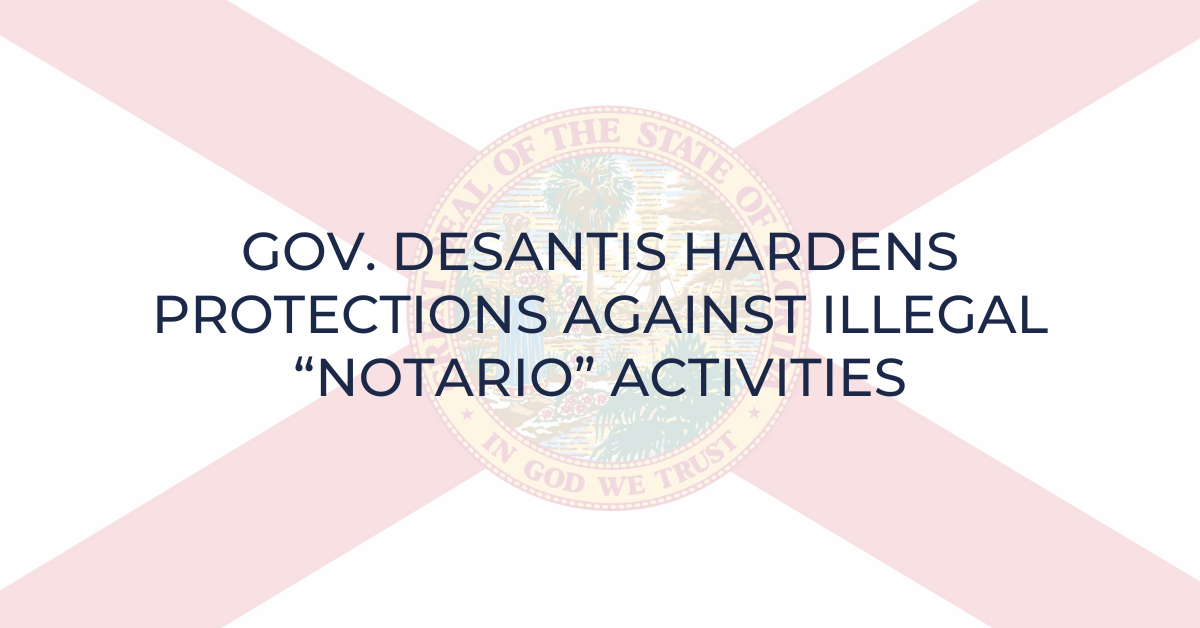Notary Public Underwriters Blog
Gov. DeSantis Hardens Protections Against Illegal “Notario” Activities
- Details
- Published: June 17, 2025

Florida Governor Ron DeSantis has signed into law a consumer-focused bill that fights unauthorized “notario publico” activities in the Sunshine State.
“Notario publico” fraud has been a concern in Florida for decades. Notarios publico seek out Florida’s immigrants and offer them services, but do so illegally because they are operating outside of the foreign country that gave them their powers.
Worse, persons who were never appointed or commissioned at all, but who can speak the same language as most of the immigrant population, misrepresent themselves as “notarios” when, in fact, they have no authority to notarize, much less provide quasi-legal services.
There are two key differences between an American notary public and a “notario publico” in other countries:
- a notario publico, who may operate only in their home country, has expanded powers beyond those of an American notary public;
and
- a notario publico charges higher fees, often significantly higher fees, than U.S. notaries are allowed to charge.
Effective July 1, 2025, Florida’s new law will prohibit non-attorney notaries from advertising in any language that may cause the reader to falsely believe that they are obtaining a real notario publico’s services.
The new law will also require any advertising by a Florida notary, in a language other than English, to include a conspicuously-sized notice in English and in the language used in the advertisement, stating “I AM NOT AN ATTORNEY LICENSED TO PRACTICE LAW IN THE STATE OF FLORIDA, AND I MAY NOT GIVE LEGAL ADVICE OR ACCEPT FEES FOR LEGAL ADVICE.” A “substantially” same notice must also be included in any advertising by radio or television.
A final, additional disclosure will be required for certain businesses and persons offering immigration services. The disclosure must be on the business or person’s main website and place of business, as applicable, and in every other language the business or person uses to provide or offer immigration services. That notice must read: “I AM NOT AN ATTORNEY LICENSED TO PRACTICE LAW AND MAY NOT GIVE LEGAL ADVICE OR ACCEPT FEES FOR LEGAL ADVICE. I AM NOT ACCREDITED TO REPRESENT YOU IN IMMIGRATION MATTERS.”
Finally, the new law establishes that persons harmed by another who violates these advertising requirements may take specified legal actions against the person or business committing the violation.
Related Article(s)
Test Your Notary Knowledge: Take Our Notary Quiz!
Customer Expectations Versus Notarization Requirements
Fighting Fraud: Why Notaries Should Avoid Using Signature Stamps
Tips to Protect Your Notary Stamp and Journal
How to Get More Notary Business Part 1: Optimize Your Marketing
How to Avoid Common Mistakes During a Notarization
When Can a Notary Use Personal Knowledge to Identify a Signer?
Does a Notary Need to See the Entire Document When Notarizing?
Can a Notary Correct a Mistake on the Notarial Certificate?
Notary FAQs: Essential Answers for Everyday Scenarios
Top Ten Mistakes That Notaries Make
Can a Notary Notarize a Family Member's Signature?
